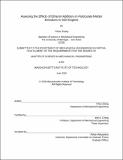Assessing the effects of ethanol addition on particulate matter emissions in GDI engines
Author(s)
Zhang, Yihao(Mechanical engineer)
DownloadFull printable version (1.929Mb)
Other Contributors
Massachusetts Institute of Technology. Department of Mechanical Engineering.
Advisor
Wai K. Cheng.
Terms of use
Metadata
Show full item recordAbstract
Previous research on the effects of ethanol addition on particulate matter (PM) emissions in GDI engines show diverse results. In this thesis, an overview on three major aspects, PM formation, effects of engine operating conditions, and ethanol effects, unveils the large number of factors that can simultaneously affect PM emissions from gasoline-ethanol blends in GDI engines, partially explaining the reasons for the diverse results from previous research. A further experimental work was conducted to assess three potential ethanol effects, displacement effect, evaporative cooling effect, and oxygen content effect. The displacement effect is based on PM Index (PMI) in the literature. Ethanol has very low PMI and thus very low propensity to form PM. Therefore, the addition of ethanol replaces the high-PMI components in the gasoline, lowering PM emissions. Although the PMI value incorporates species reactivity and volatility, it does not take latent heat of vaporization (HOV) into account. The high HOV of ethanol suppresses the fuel evaporation and potentially causes more liquid fuel films, which serve as sources for PM emissions. This evaporative cooling effect was assessed along with the oxygen content effect, a widely used effect in the literature to explain why ethanol lowers PM emissions. Through the method of control variables, the displacement effect and oxygen content effect were separated out and could be assessed individually. The existence of the displacement effect was confirmed. It was also found that the oxygen content effect was negligible, while the evaporative cooling effect changed PN emission significantly. The extent of the evaporative cooling effect depended on operating conditions, such as fuel injection timing, engine coolant temperature, and load.
Description
Thesis: S.M., Massachusetts Institute of Technology, Department of Mechanical Engineering, 2018. This electronic version was submitted by the student author. The certified thesis is available in the Institute Archives and Special Collections. Cataloged from student-submitted PDF version of thesis. Includes bibliographical references (pages 75-78).
Date issued
2018Department
Massachusetts Institute of Technology. Department of Mechanical EngineeringPublisher
Massachusetts Institute of Technology
Keywords
Mechanical Engineering.